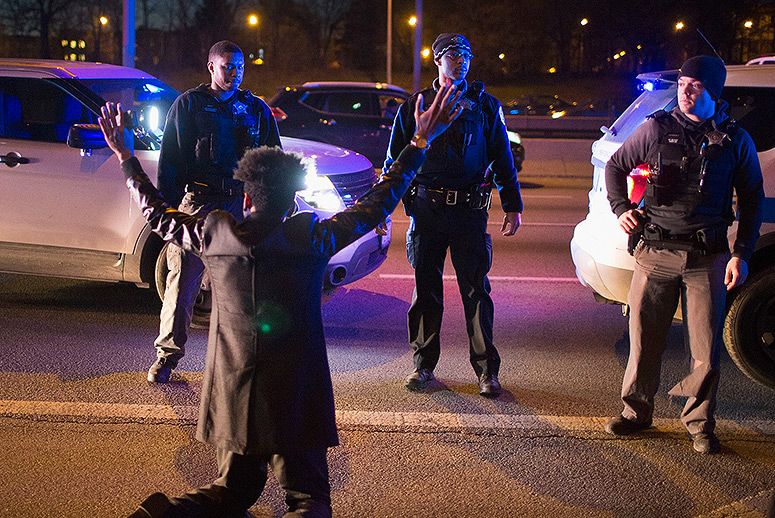

By David M. Greenwald
Executive Editor
The tragic death of Tyre Nichols in Memphis put the spotlight back on vehicle stops and racial profiling. At Monday’s Police Accountability Commission meeting in Davis, Davis Police Chief Darren Pytel called the beating one of the worst he had seen, stating that there was nothing in that stop that appeared to be proper police technique.
While the city of Davis, along with many communities, issued a statement calling out the conduct, the city has seemingly dragged its feet on dealing with police stops—even as communities like Berkeley, Oakland, and San Francisco have attempted to curtail pretext stops.
This week, the San Francisco Chronicle released a report with newly available police stop data that shows the continuation of “stark racial disparities” in wealthy Bay Area enclaves—Davis is one of the comparison cities.
“Despite large police departments across California ramping up their efforts to stamp out racial profiling, those initiatives have done little — if anything — to close the vast gap between Black and white people who are stopped and searched by officers,” the Chronicle reported.
The data for Davis from 2021, the most recent RIPA (Racial and Identity Profiling Advisory Board) data available, showed for white drivers, about 646 stops per 10,000 people. For Blacks, it was 2979 per 10,000. That’s just under a 5 to 1 ratio.
That’s a similar rate but slightly higher to Sacramento (2966 to 754) and similar but slightly lower rate than San Francisco (1504 to 283).
“In San Francisco and Los Angeles, Black people were at least five times as likely to be stopped by police than white residents in 2021, when factoring in the relative city populations of the racial groups. In Oakland, Black people were six times as likely to be stopped,” the Chronicle reported.
The data allowed the Chronicle for the first time to analyze police stops in 41 smaller agencies.
“That data shows that some of the Bay Area’s wealthiest midsize communities had the starkest racial disparities. In Los Altos and Belmont, two Silicon Valley suburbs, Black people were nine and 10 times as likely to be stopped by police, respectively, than white residents in 2021, relative to their share of the population,” they report.
“In Berkeley and Petaluma, Black people were seven and five times as likely, respectively, to be stopped.”
“But the starkest racial disparity in the state was in Piedmont, the predominantly white and wealthy neighbor to Oakland. Black residents are 1% of Piedmont’s population and accounted for 29% of all police stops, meaning they were nearly 50 times as likely to be stopped relative to their share of the population as white people,” the Chronicle reported.
There is a second part to this data however.
“Police aren’t just more likely to stop Black people in California. They’re also far more likely to search them once they stop them, according to the data,” the Chronicle reported.
This disparity is so bad, in fact, that “officers conducted more searches of Black people overall than of white people in 2021, despite the fact that the state has more than six times as many non-Hispanic white people as Black.”
The kicker is “when officers do search Black people, they are less likely to find contraband on them than in their searches of white people, including illegal guns, drugs and other prohibited items, the data shows.”
This is a finding that is repeated over and over again, not just in Davis, not just in California, but nationwide and it leads to the conclusion that a high proportion of searches of Black and brown people are not objectively warranted.
The question is what should be done.
Davis Police Chief Pytel has warned that the data is difficult to interpret.
“It’s complex because this raises the same issues with benchmarking that have long existed,” he said. He believes that “we don’t have enough stops each year to draw any real conclusions because the data points are so low and even small numbers change the results.”
He added that “we’ve changed so many practices that have resulted in fewer stops, arrests, and citations for both adults and juveniles. But with the fewer data points, comparisons to population estimations creates a larger perception of disparity.”
Pytel said that they will be releasing additional stop data for 2021 and 2022 in the next month or two with comparisons to the state data.
The council has addressed many of the community recommendations, but has yet to draft a policy for police stops.
In January, the San Francisco Police Commission voted 4-2 to limit pretexual traffic stops and seeks to help reduce racial bias in policing. Cities including Los Angeles, Berkeley, Washington, D.C., and Philadelphia have passed measures that ban pretext stops.
In Los Angeles, for instance, pretext stops were banned but the policy does not prohibit officers from pulling people over for minor violations. Police are prevented from using those infractions to fish for other crimes.
In San Francisco, officers will be able to pull people over for minor infractions, such as expired registration tags or a broken taillight, but will not be able to use those stops to probe for additional criminal activity.
Data continues to show that such stops cost significant police time and money, but seldom prevent crime and disproportionately target people of color.
In addition to local measures, the recent tragedy might push the state to revive efforts from last year that failed.
Senator Steven Bradford from Los Angeles County introduced legislation that would limit officers’ ability to conduct pretextual stops.
SB 50 would allow local governments to “explore non-law enforcement approaches to traffic safety,” Bradford has not finalized the bill’s language, but it would be similar to the bill that failed last year, that would have prohibited officers from stopping motorists solely for certain low-level infractions.

